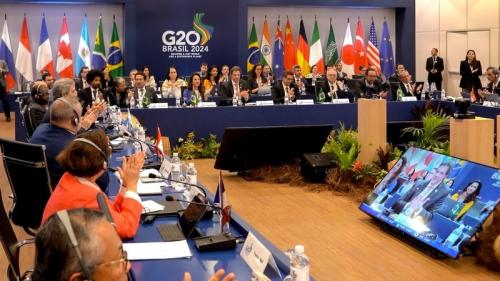
https://www.g20.org/en/news/g20-brasil-reaches-consensus-on-key-communiq...
G20 Brasil secures consensus on Finance Track document: ministerial declaration on international tax cooperation and geopolitical issues marks the end of years without communiqués. The announcement was made by Brasil’s Finance Minister Fernando Haddad on July 26 in Rio de Janeiro.
According to the minister, the documents signed by G20 Finance Ministers and Central Bank Presidents emphasize Brazilian priorities. They specifically mention including the taxation of the super-rich on the international agenda, increasing funding for ecological transitions, strengthening Multilateral Development Banks (MDBs), supporting indebted nations, and promoting global governance reforms.
“We view this as a victory for Brasil and the international community. After years without a comprehensive document, its 35 consensually adopted paragraphs reflect key areas of the global economy. We aim for more transparent, fair, and equitable tax systems, especially for the super-rich, who must contribute to more equitable and sustainable societies based on their capacity,” celebrated Haddad.
Central agendas in the global economy
Haddad pointed out that discussions have advanced toward a roadmap for MDB reform, including recommendations for major economies to expand these institutions' financial capacity. Additionally, member countries aim to strengthen debt relief mechanisms for the poorest countries, allocate resources for health investments, and enhance dialogue with civil society.
“The Finance Track is crucial in creating a more favorable global cooperation and solidarity environment. Since the issues addressed are global, there is no national solution to the climate crisis. This track must strengthen cooperation mechanisms,” emphasized the Brazilian minister.
Global Alliance against Hunger
Haddad noted that the working group responsible for creating the Global Alliance against Hunger and Poverty identified fragmented efforts to ensure food security. The Brazilian presidency aimed to compile a pool of best practices in public policy on the issue to share with countries joining the initiative.
“Brasil has social technologies to offer, but many other countries do as well. In Brasil, these technologies are being reactivated to reduce hunger. We will develop a virtual platform focused on effective tools, offering coordinated technical assistance and funding to support these efforts,” said Haddad.









